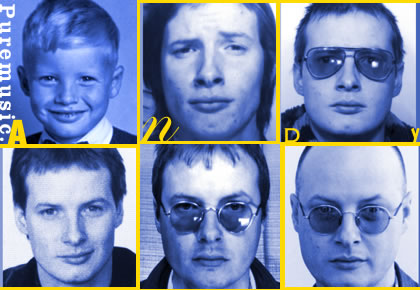
A Conversation with
Andy Partridge
(continued)
PM: I'm interested to know, all the mishaps considered, are you writing much these days yourself?
AP: Yeah. What I've been doing is storing on--well, cassettes, to be honest--storing just hundreds of ideas, little sketches for songs. And I've really not been finishing any of them off. So what I should do is dig all these out and run through them all, because it looks like I'm kind of forced into going solo right now.
PM: Yeah.
AP: So I'm going to have to check out all these things and finish off the best pieces. But yeah, I'm still writing. But I'll tell you what, after I got to do this Monstrance improvisation, I've been slightly spoiled, because I loved the freedom of improvising. So I may try to put more of that into my music. I mean, I do that kind of thing occasionally. I don't know if you know this, there's a track on Fuzzy Warbles#7 called "2 Rainbeau Melt."
PM: Right. I do know that.
AP: Yeah. Now, that started off as a poem. And when I finished it, I was happy with it. And I thought, wow, why leave it as a poem? That could be a great song lyric. Why don't I approach it like the "Prince of Orange" process, where you grab the first thing, it doesn't have to make sense, it doesn't have to be the correct structure, it doesn't even have to be the right sort of architectural balance or anything. You just grab something and you make it work. And I did that with "2 Rainbeau Melt." I just grabbed the first little guitar figure, and okay, that's it, and the first sounds that came up. I have a little virtual mellotron there, and I think I had a sample of something like a linnet singing, and I'd just run my hand over that, and well, okay, that's going in as well. And it was a case of nailing in the first things that I found, and making them work.
PM: Wow.
AP: Grabbing little motifs, and whenever, the first motif you grab is going to be the one that's going to go in there. And it seemed to work out okay. So, in a way, you're sort of improvising with yourself, if you know what I mean.
PM: To a guy who has been doggedly pursuing writing for the mainstream country market, that sounds fascinating.
AP: Well, yeah, it's turning off the controller, and you just accept the first thing that comes up, it doesn't matter if it's wrong or right. Because it's the first thing, you give it permission to be right.
PM: I've got to follow your lead there. I got to check some of that out.
AP: But I've done other songs like that in the past. "My Brown Guitar" was done like that. "Prince of Orange" was done like that, on Fuzzy Warbles. "Blue Beret" is an obscure XTC song that we never got into the studio, that was done in the same way. You sing, you improvise a line, and then the next line that comes out of your mouth doesn't have to make sense. It may comment on the previous one, it doesn't have to make any sense. So what you end up with is like an impressionist painting. You don't end up with a photograph of an event, you end up with an impressionistic kind of thing. And it's the same with the music, you just grab the first things. Okay, I'm going to start off in G here, I'm going to do four bars of G, and then for no reason at all, I'm going to do two bars of B. And then I'll grab something totally unrelated, then I'll do four bars of B-flat. You just grab the first thing, and you make it work. It's kind of like short-circuiting your editor.
PM: Yeah, just sending him out for a hot dog.
AP: Yeah, yeah. "Say, look, go and get me a hot dog." And while he's gone out, you go, "Hee hee hee, now we can play."
[laughter]
AP: It's like you have to be a kid to create. You have to do that wrong thinking thing. You have to jump off the tracks to create. But the editor is good, because the editor can then come in and say, "Well, that's too damn long, and you know that piece is crap, and you can write a better line than that," or, "This whole idea sucks. Let's try another one." Editors are more important, but the trouble is that the more powerful they get over the years, they can sometimes stop the kid from creating.
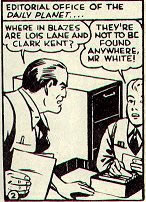
PM: Yeah, I mean, you have to have the sense and develop the inner sense to bring them in at the end, not at the beginning.
AP: Exactly. But sometimes Perry White gets so big--
PM: [laughs]
AP: --that he wants to come in right at the start, and poor old Clark Kent doesn't even get the first word of his story typed up.
PM: He wants to ruin Jimmy Olsen's fun.
[laughter]
AP: Yeah, exactly. He wants to take Jimmy Olsen by his little ginger head and beat it against the wall there. So anything you can do to fool the editor, I think helps creativity.
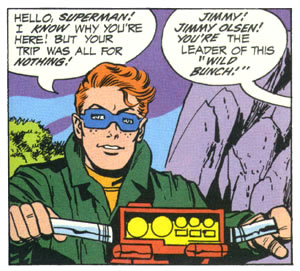
PM: How is the family, Andy, if I may ask, and how old are the kids now?
AP: My daughter is twenty-one. And she's in a band called The SheBeats.
PM: Wow.
AP: Which, if you tap myspace, "The SheBeats," you'll hear some of their demo home recordings.
PM: Fantastic.
AP: And I'll tell you, about the first 300 songs I ever wrote in my life were dog shit. But she started writing songs, and the first three or four are just great.
PM: Wow.
AP: I don't know how she's done it. I didn't give her any help. I didn't give her any tips or anything. She just went ahead and did it. I didn't even know she played guitar that well. So she's got a band called The SheBeats. And they're just kind of starting out, like they've just done about a half dozen gigs by now.

And my son, who's nineteen, Harry, he's studying animation at university. He's like a junior Walt Disney. And whenever I talk to him, he's working on doing like a musical--he's also pretty musical, he plays guitar and keyboards. And he's kind of writing these musicals--as in the musical type genre thing--and animating them. So we'll be hearing from him, as well, in a few years.
PM: Wow! What an interesting pair of kids.
AP: Yeah.
PM: Well, I hope that Ape House Records becomes a platform for all kinds of Andy-inspired things in the future, because I know there's so much great music inside your soul. And there are many of us out here who want to keep up with it, and want to keep listening to whatever it is you're doing.
AP: Oh, jeez, Frank, that's encouraging.
PM: It's wonderful to talk with you, Andy. You're just a really great fellow. And your music has really meant a lot to me. I appreciate it a lot.
AP: Oh, thank you so much. I appreciate your time, it's been fun.
![]()
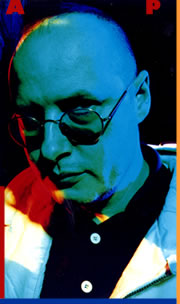 |
listen to clips |
| print (pdf) | |
| buy the Fuzzy box here | |
| ape.uk.net | |
| xtcidearecords.co.uk | |
| chalkhills.org * | |
| optimismsflames.com | |
| puremusic home |
* If you'd like to dig deeper into XTC, we suggest a tour of the vast and wonderful fansite chalkhills.org or the brightly burning optimismsflames.com |
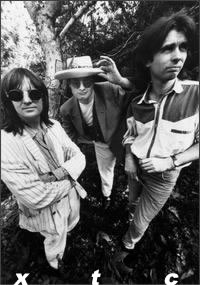 |